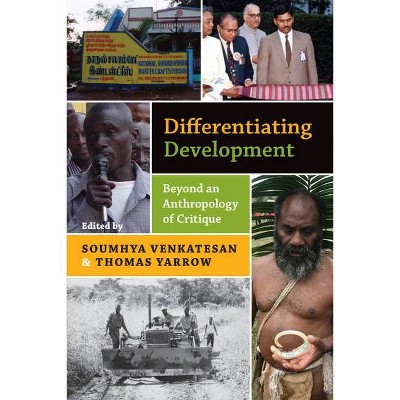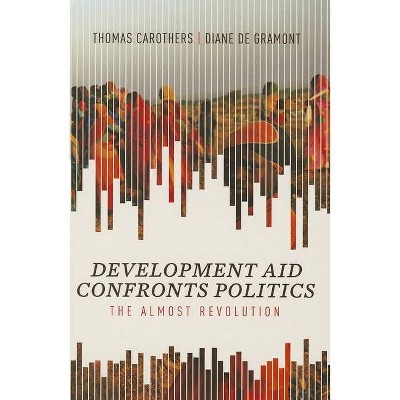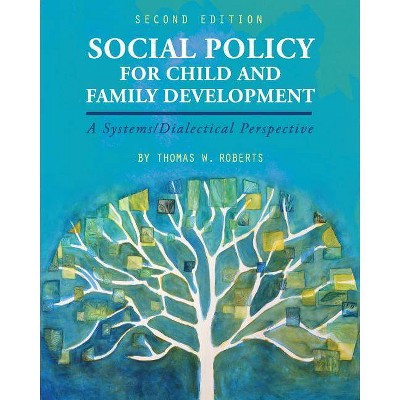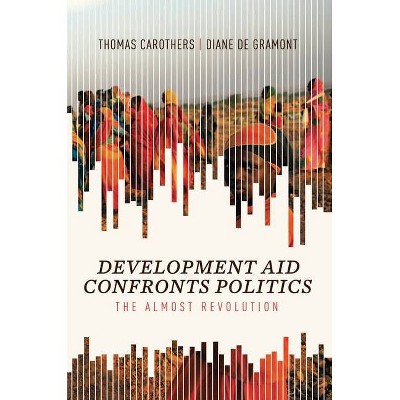Differentiating Development - by Soumhya Venkatesan & Thomas Yarrow (Paperback)

Similar Products
Products of same category from the store
AllProduct info
<p/><br></br><p><b> About the Book </b></p></br></br>"Over the last two decades, anthropological studies have highlighted the problems of 'development' as a discursive regime, arguing that such initiatives are paradoxically used to consolidate inequality and perpetuate poverty. This volume constitutes a timely intervention in anthropological debates about development, moving beyond the critical stance to focus on development as a mode of engagement that, like anthropology, attempts to understand, represent and work within a complex world. By setting out to elucidate both the similarities and differences between these epistemological endeavors, the book demonstrates how the ethnographic study of development challenges anthropology to rethink its own assumptions and methods. In particular, contributors focus on the important but often overlooked relationship between acting and understanding, in ways that speak to debates about the role of anthropologists and academics in the wider world. The case studies presented are from a diverse range of geographical and ethnographic contexts, from Melanesia to Africa and Latin America, and ethnographic research is combined with commentary and reflection from the foremost scholars in the field." From Publisher's Website.<p/><br></br><p><b> Book Synopsis </b></p></br></br><p> Over the last two decades, anthropological studies have highlighted the problems of 'development' as a discursive regime, arguing that such initiatives are paradoxically used to consolidate inequality and perpetuate poverty. This volume constitutes a timely intervention in anthropological debates about development, moving beyond the critical stance to focus on development as a mode of engagement that, like anthropology, attempts to understand, represent and work within a complex world. By setting out to elucidate both the similarities and differences between these epistemological endeavors, the book demonstrates how the ethnographic study of development challenges anthropology to rethink its own assumptions and methods. In particular, contributors focus on the important but often overlooked relationship between acting and understanding, in ways that speak to debates about the role of anthropologists and academics in the wider world. The case studies presented are from a diverse range of geographical and ethnographic contexts, from Melanesia to Africa and Latin America, and ethnographic research is combined with commentary and reflection from the foremost scholars in the field.</p><p/><br></br><p><b> Review Quotes </b></p></br></br><br><p> "<em>The themes and styles are refreshingly diverse but all the contributors remind us that what many development scholars and policy-makers downgrade as 'context' - history, ways of making meaning, political disputes - are often central to explaining development practice...[This book] not only implies the need for a classificatory rethink, which has been widely recognized for decades, but also gives us the ethnographic material to see how fruitful a more concerted anthropology of development in Europe could be.</em>" <strong> - </strong><strong>Journal of the Royal Anthropological Institute</strong></p> <p> <em>"...offers an interesting and important read in making sense of what seems to have become a somewhat uneasy relationship between anthropology and development... [The volume] should be applauded for putting increased emphasis on ethnography and agency by showing how these constitute a critical hope that both post-development and anthropology will contribute to and be relevant for development. It seeks not only to describe and analyze but, more importantly, to revamp critically how anthropology as a discipline engages the field of development."</em><b> - Social Analysis</b></p> <p> "<em>This is a book whose time is overdue...It is a welcome addition to a burgeoning field of anthropological studies in which development plays a part, a book that will be widely read and appreciated</em>...<em>[It is]sophisticated, relevant, sufficiently up to date and interesting in the way in which it framed the new forms that anthropological engagement with development might take.</em>" <strong> - </strong><strong>Andrea Cornwall</strong>, University of Sussex</p><br><p/><br></br><p><b> About the Author </b></p></br></br><p> <strong>Thomas Yarrow </strong>lectures in Social Anthropology at Durham University. He is the author <em>of Development Beyond Politics: Aid, Activism and NGOs in Ghana </em>(Palgrave, 2011), and the co-editor of <em>Archaeology and Anthropology: understanding similarity, exploring difference </em>(Oxbow, 2010). </p>
Price History
Price Archive shows prices from various stores, lets you see history and find the cheapest. There is no actual sale on the website. For all support, inquiry and suggestion messagescommunication@pricearchive.us




















